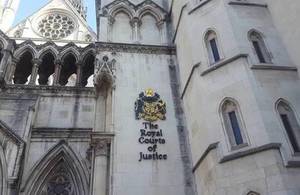News story: Government announces plans to tackle illegal traveller sites
Sajid Javid set out draft measures aimed at making it easier for officers to intervene and remove travellers from land they should not be on.
The Home Secretary will also consider making it a criminal offence to set up such camps. It is currently defined in law as trespassing, a civil matter.
In addition, the Ministry for Housing, Communities and Local Government (MHCLG) announced it will provide local authorities with practical and financial support to handle unauthorised encampments.
Home Secretary Sajid Javid said:
The vast majority of travellers are law-abiding citizens – but illegal sites often give an unfair, negative image of their community and cause distress and misery to those who live nearby.
There is a widespread perception that the law does not apply to travellers and that is deeply troubling.
The result of our initial consultation was clear – people want to see greater protection for local communities and for the police to be given greater power to crack down on trespassers.
Communities Secretary Rt Hon James Brokenshire MP said:
During our consultation, we have heard accounts of needless and unacceptable noise, abusive and threatening behaviour and extensive litter and waste from illegal traveller sites.
Only a small minority of people are causing this distress, but it’s right that police are given extra powers to step in.
We are committed to working with councils to help them deal with these challenging cases, while also ensuring travellers have good access to legal sites.
The plans follow an initial consultation by the government to look at how to strengthen the response from police and local authorities, following calls for robust measures to protect landowners and those living close by.
The consultation response was clear problems are caused for communities by travellers moving from place to place – so councils will be reminded of their existing obligation to provide enough “transit sites” to reduce the risk of communities seeing illegal sites set-up on their doorstep and to identify suitable sites, so problems are not simply shifted on to neighbouring areas.
MHCLG has committed to give councils up to £1.5 million of extra funding to help them enforce planning rules and tackle unauthorised sites, with funding also available under the £9 billion Affordable Homes Programme to help pay for legal pitches.
Alongside this, the department has given £250,000 to support projects working with Gypsy, Traveller and Roma communities to tackle discrimination, improve integration, healthcare and education.
As part of the measures announced today, ministers will consider making data available on where legal sites are so it is clear which authorities are not offering their fair share of traveller facilities. Under new guidance to be published, the Communities Secretary will step in and review cases where there are concerns raised there are too many authorised traveller sites in one location.
Additionally, the Home Office will launch a review into whether it should criminalise the act of trespassing when setting up an encampment. A change in the law may allow the police to respond quicker and take tougher action.
The Home Office will also consult on proposals to amend the Criminal Justice and Public Order Act 1994 to:
- lower the number of vehicles needed to be involved in an illegal camp before police can act from 6 to 2
- give the police powers to direct travellers to sites in neighbouring local authorities. Currently they can only direct trespassers to sites in the same area
- allow officers to remove trespassers from camping on or beside a road
- increase the time – from 3 months to a year – during which travellers are not allowed to return to a site they have already been removed from
